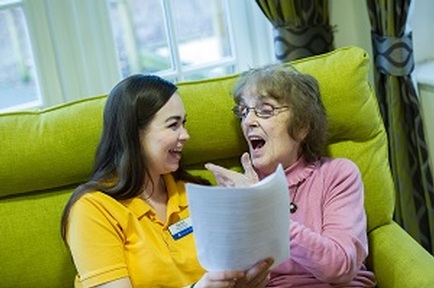Music and dementia: 'When we talk to Mum about the choir her eyes light up'
The daughters of a care home resident with dementia have revealed how her face ‘fills with joy’ when she sings, with her eyes ‘lighting up’ when they talk to her about the care home choir she is in.

Sanctuary Care’s Iffley Residential and Nursing Home in Oxfordshire, only started the choir recently but has already seen a big change in residents such as Barbara Goodwin.
When activities leader Rachel Bearn, who has a background in musical theatre, hands out song sheets Barbara sits excitedly awaiting the music. Ms Bearn said: “Her expression when she sings is truly heart-warming. Her face is filled with joy as she sings ‘Somewhere Over the Rainbow’ with what can only be described as sheer gusto. Her body language is as equally as expressive as she holds her hands up into the air as if to help her hit the high notes.”
Ms Bearn has found the choir has been an inclusive way for all the staff in the home to engage with their residents. “No matter what your role, when you work in a care home you want to be close to your residents and share special moments with them – when you are singing with them you can do that. Sometimes they may not communicate verbally, but might hear a particular piece of music and burst into song. You can sing with them and there is that immediate connection. They open up and you can see how much better they feel,” she said.
Barbara’s daughter, Fiona Evans, believes the choir has had such a big impact, it has become “a great part of her week, which makes her feel very happy. When we talk to mum about the choir her eyes light up, even if she can’t remember what she sang.
“Some of the songs remind her of her school days in Penzance, Cornwall and she is keen to correct anyone who may get the words wrong to ‘Tea for Two’!”
Studies have found that music can have a huge impact on people with dementia, having a calming effect, reducing anxiety and agitation. It also enables them to reconnect with memories, making it an incredibly therapeutic activity.
Alzheimer’s Society has over 300 Singing for the Brain groups across the country. The charity’s director of operations, Kathryn Smith said: “For a person living with dementia memories can become increasingly hard to retrieve, however music can sometimes help recall due to the preserved memory for song and music in the brain.
“Many people with dementia are still able to enjoy music and to sing even when they are starting to lose their language abilities, which is something that has been highlighted by the wonderful choral project at Sanctuary Care’s Iffley home.
“It is so inspiring to hear about stories like this. We know that singing can help people with dementia communicate, improve their mood, and leave them feeling good about themselves. Singing for the Brain groups can provide a way for people with dementia, along with their carers, to express themselves and socialise with others in a fun and mutually supportive environment.” As well as bringing more enjoyment into Barbara’s life, the choir has also helped assuage some of the guilt and sadness, Fiona and her sister Joanna Barrington, felt over moving their mother to a care home.
Barbara, a former post office clerk, had slowly started to become withdrawn and became increasingly forgetful. She would go on bus journeys alone for hours, completely losing track of time. Barbara started taking less care of her appearance and would forget to eat and drink. Fiona says: “It was incredibly sad to see a vibrant woman of the community slowly becoming withdrawn.”
“As a family you have to make decisions and it’s very stressful. The role of the parent and child is reversed. However, it was a relief because we were able to get mum the care she so needed as it was not safe for her to continue living independently.
Barbara, who used to sing in the church choir as a young girl, moved into Iffley in 2004. Rachel Bearn, who runs the choir, has found it can also make a difference to residents unable to communicate verbally, with them “suddenly singing whole songs and remembering all the words”. “We have some residents who find it hard to speak but when I start to sing their eyes light up. It is so special for their loved ones who have noticed a big difference and it makes them so happy to see their mother or father joining in.”
One former resident spoke English fluently but as her dementia progressed she reverted back to speaking in Spanish, her native tongue because in her mind she was a young lady again. However, Ms Bearn started to sing ‘Don’t Cry for Me Argentina’ and she suddenly started to sing the entire song in English. She says: “It was wonderful because when she started to speak in Spanish it was obviously more difficult to have a conversation with her, but through music we could truly connect.”
Latest News
 29-Jul-24
Dementia Bus gives carehome.co.uk staff insight into life with dementia
29-Jul-24
Dementia Bus gives carehome.co.uk staff insight into life with dementia
 01-Mar-24
Find out the top care homes in 2024
01-Mar-24
Find out the top care homes in 2024
 21-Mar-23
UK's top care homes in 2023 revealed
21-Mar-23
UK's top care homes in 2023 revealed
 03-Jan-23
carehome.co.uk launches free care helpline
03-Jan-23
carehome.co.uk launches free care helpline
 13-Dec-22
5 mins with Emily Whitehurst, chief operating officer for Constantia Healthcare
13-Dec-22
5 mins with Emily Whitehurst, chief operating officer for Constantia Healthcare